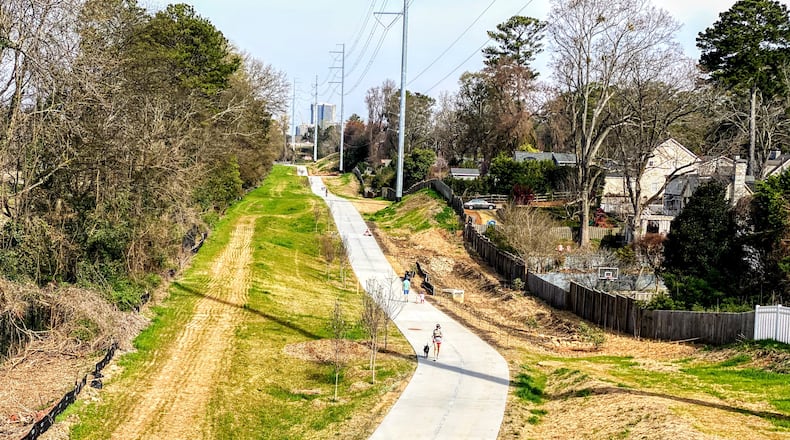About two dozen Atlanta homeowners are a step closer to getting reimbursed from the seizure of their property five years ago to build the Beltline.
A federal judge on Tuesday ruled that the U.S. government illegally allowed the Atlanta Beltline agency in 2017 to seize portions of the property owners’ backyards without compensation to make room for the walking path and planned light-rail transit line.
The land seizure occurred at homes located on Flagler Avenue in the intown Piedmont Heights neighborhood across from the Ansley Golf Club.
The ruling by the U.S. Court of Federal Claims in Washington is subject to appeals. A St. Louis attorney representing the plaintiffs estimated that each property owner could receive a payment totaling hundreds of thousands of dollars.
It’s the latest development in a long-running legal dispute involving the city of Atlanta’s aggressive construction of the 22-mile Beltline. While it’s been popular with walkers and cyclists, and pushed property values sky-high, the Beltline has also intruded on some homeowners’ yards.
At least three separate lawsuits have been filed by groups of Atlanta property owners over the Beltline’s seizure of their property. The property owners have prevailed in some rulings in two of the cases, though they both remain pending in U.S. Court of Federal Claims. The cases involve multiple property owners in the Ansley Park neighborhood. A separate lawsuit involving DeFoor Hills property owners was settled last year.
Gordon Ragan, a plaintiff in the Piedmont Heights case that received the favorable ruling on Tuesday, said that when the Beltline condemned a portion of his yard, he was forced to give up a dog run he had built. His neighbors lost more valuable improvements like a basketball court, fences and a treehouse for children.
“We really felt strong-armed by them,” he said. “Most of us wanted the Beltline but they were like Big Brother coming in. It really made us angry.”
A spokeswoman for the Atlanta Beltline, a city agency, declined to comment. The U.S. Justice Department, the named defendant in the case, did not respond to a request for comment.
The dispute stems from the federal law that allows local governments to build public-use trails on the rights-of-way of unused railroad lines. The Beltline relied on that law to condemn property within Norfolk Southern’s 200-foot-wide right-of-way in northeast Atlanta.
The half-mile section of the Beltline bordered by Piedmont Heights and Ansley Park where property owners lost some of their yards has since been paved and completed. The trail runs between the Buford Highway Connector and Montgomery Ferry Drive.
Each homeowner lost an average of 6,000 square feet of property, said Meghan Largent, a St. Louis-based lawyer for plaintiffs in the case tied to the Tuesday ruling. The next phase of the court case will involve the plaintiffs and the federal government hiring appraisers to determine a value for these properties.
The Justice Department can appeal the Tuesday ruling by Judge Zachary Somers, Largent said.
About the Author
The Latest
Featured



